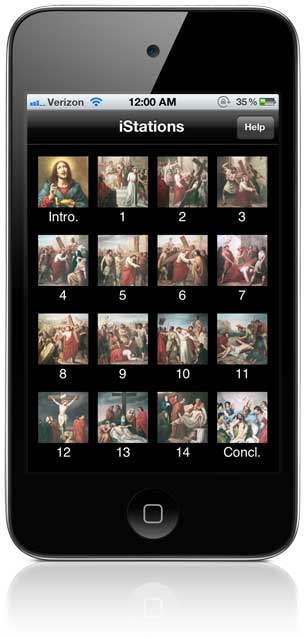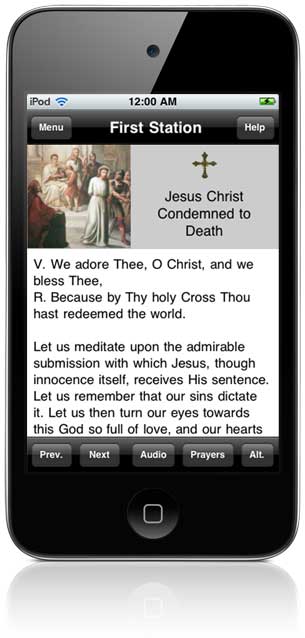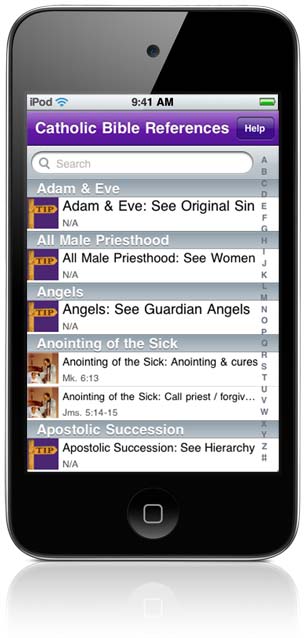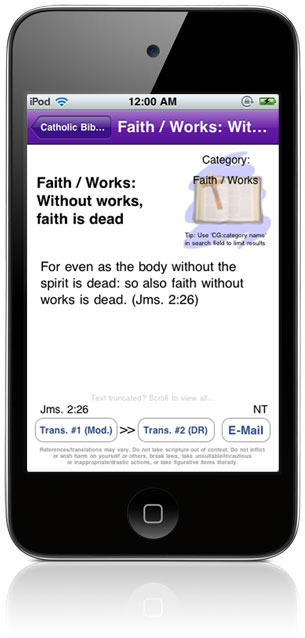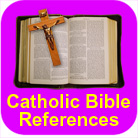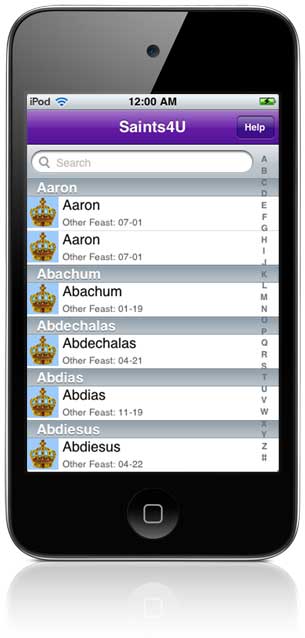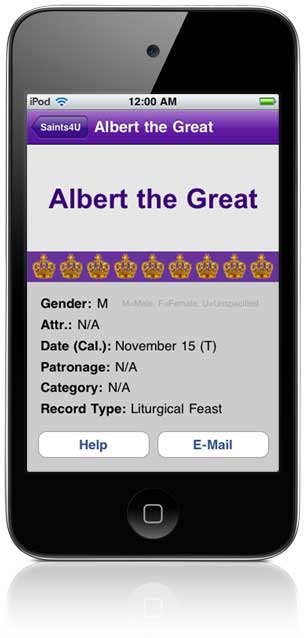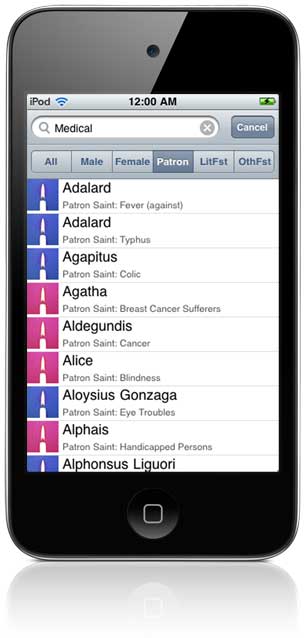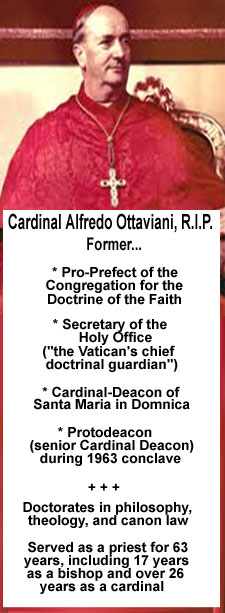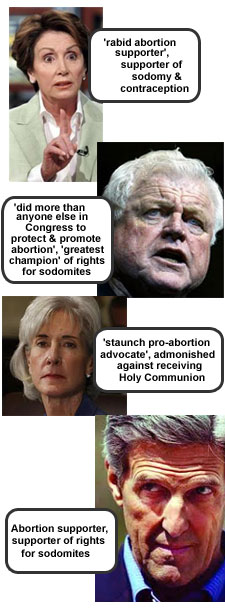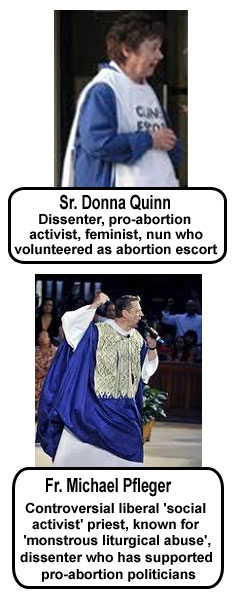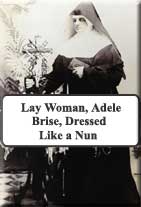The following are some highlights from "Universae Ecclesiae" (Instruction On The Application Of The Apostolic Letter Summorum Pontificum Of His Holiness Pope Benedict XVI Given Motu Proprio). The document, issued by the Pontifical Commission Ecclesia Dei & signed by Cardinal William Levada, was approved by Pope Benedict XVI on April 8, 2011. The Instruction, dated April 30, 2011 (feast of Pope St. Pius V based on the
Novus Ordo calendar), was released to the public on May 13, 2011 (anniversary date of the first
Marian apparition at Fatima). Issuance of the Instruction was preceded by an "inquiry made among the Bishops of the world, and with the desire to guarantee the proper interpretation and the correct application of the Motu Proprio Summorum Pontificum" by the Pontifical Commission Ecclesia Dei.
Please Note: We have inserted some comments below [e.g. in brackets/headers]. We have also made a few spelling changes.
*
Summorum Pontificum "has made the richness of the Roman Liturgy more accessible to the Universal Church". This 2007 document of Pope Benedict XVI "promulgated a universal law for the Church, intended to establish new regulations for the use of the Roman Liturgy in effect in 1962"
* "The Holy Father, having recalled the concern of the Sovereign Pontiffs in caring for the Sacred Liturgy and in their recognition of liturgical books, reaffirms the traditional principle, recognized from time immemorial and necessary to be maintained into the future, that 'each particular Church must be in accord with the universal Church not only regarding the doctrine of the faith and sacramental signs, but also as to the usages universally handed down by apostolic and unbroken tradition. These are to be maintained not only so that errors may be avoided, but also so that the faith may be passed on in its integrity, since the Church's rule of prayer (lex orandi) corresponds to her rule of belief (lex credendi).'"
* "The Holy Father stresses moreover that, among the sacred liturgical books, the Missale Romanum has enjoyed a particular prominence in history, and was kept up to date [e.g. prayers added for new canonizations] throughout the centuries until the time of Blessed Pope John XXIII."
[Note: This does not mean the traditional liturgy was subject to continual change. Click here for a brief history of the Traditional Mass] * "The Roman Missal promulgated by Pope Paul VI and the last edition prepared under Pope John XXIII, are two forms of the Roman Liturgy, defined respectively as ordinaria and extraordinaria: they are two usages of the one Roman Rite, one alongside the other. Both are the expression of the same lex orandi of the Church." [How then could the "chief architect" of the Novus Ordo proudly remark that "The liturgical reform (of the 1960's) is a major conquest of the Catholic Church" if the two liturgies are really the same?]
* "On account of its venerable and ancient use, the forma extraordinaria is to be maintained with appropriate honor." [Only on account of its "venerable and ancient use"? What about its manifest orthodoxy, proven good fruits, great reverence, ability to inspire the faithful...?]
* The Motu Proprio was "needed" and "it was a matter of overcoming a lacuna by providing new norms for the use of the Roman Liturgy of 1962". In fact, due to "the increase in the number of those asking to be able to use the forma extraordinaria, it has become necessary to provide certain norms in this area."
* The Instruction quotes Pope Benedict's statement that "What was sacred for prior generations, remains sacred and great for us as well, and cannot be suddenly prohibited altogether or even judged harmful."
* The Instruction cites three aims of Summorum Pontificum: "a.) offering to all the faithful the Roman Liturgy in the Usus Antiquior, considered as a precious treasure to be preserved; b.) effectively guaranteeing and ensuring the use of the forma extraordinaria for all who ask for it, given that the use of the 1962 Roman Liturgy is a faculty generously granted for the good of the faithful and therefore is to be interpreted in a sense favorable to the faithful who are its principal addressees; c.) promoting reconciliation at the heart of the Church."
* The Pontifical Commission Ecclesia Dei exercises power for "monitoring the observance and application of the provisions of the Motu Proprio Summorum Pontificum" and exercises this power "beyond the faculties previously granted by Pope John Paul II and confirmed by Pope Benedict XVI (cf. Motu Proprio Summorum Pontificum, art. 11-12), also by means of the power to decide upon recourses legitimately sent to it, as hierarchical Superior, against any possible singular administrative provision of an Ordinary which appears to be contrary to the Motu Proprio." Also, "The decrees by which the Pontifical Commission decides recourses may be challenged ad normam iuris before the Supreme Tribunal of the Apostolic Signatura." Furthermore, Ecclesia Dei will "have the task of looking after future editions of liturgical texts pertaining to the forma extraordinaria of the Roman Rite." [Get out your rosary]
* Diocesan bishops "are to monitor liturgical matters in order to guarantee the common good and to ensure that everything is proceeding in peace and serenity in their Dioceses, always in agreement with the mens of the Holy Father clearly expressed by the Motu Proprio Summorum Pontificum. In cases of controversy or well-founded doubt about the celebration in the forma extraordinaria, the Pontifical Commission Ecclesia Dei will adjudicate." Further, "It is the task of the Diocesan Bishop to undertake all necessary measures to ensure respect for the forma extraordinaria of the Roman Rite, according to the Motu Proprio Summorum Pontificum."
* The "group of the faithful" (coetus fidelium) referred to in the Motu Proprio Summorum Pontificum "can be said to be stabiliter existens ("existing in a stable manner")...when it is constituted by some people of an individual parish who, even after the publication of the Motu Proprio, come together by reason of their veneration for the Liturgy in the Usus Antiquior, and who ask that it might be celebrated in the parish church or in an oratory or chapel; such a coetus ('group') can also be composed of persons coming from different parishes or dioceses, who gather together in a specific parish church or in an oratory or chapel for this purpose."
* "In the case of a priest who presents himself occasionally in a parish church or an oratory with some faithful, and wishes to celebrate in the forma extraordinaria...the pastor or rector of the church, or the priest responsible, is to permit such a celebration, while respecting the schedule of liturgical celebrations in that same church." And, "Even in sanctuaries and places of pilgrimage the possibility to celebrate in the forma extraordinaria is to be offered to groups of pilgrims who request it", assuming there is a "qualified priest" (see below).
* Potential 'time bombs': "In deciding individual cases, the pastor or the rector, or the priest responsible for a church, is to be guided by his own prudence [wildly liberal though he may be], motivated by pastoral zeal and a spirit of generous welcome." And, "In cases of groups which are quite small, they may approach the Ordinary of the place to identify a church [perhaps a church in the most remote/undesirable corner of the diocese?] in which these faithful may be able to come together for such celebrations, in order to ensure easier participation [for who exactly?] and a more worthy celebration [?] of the Holy Mass."
* A new 'litmus test' for Mass? "The faithful who ask for the celebration of the forma extraordinaria must not in any way support or belong to groups which show themselves to be against the validity or legitimacy of the Holy Mass or the Sacraments celebrated in the forma ordinaria or against the Roman Pontiff as Supreme Pastor of the Universal Church." [How about the same 'litmus test' for liberals who "show themselves to be against the validity or legitimacy" of the Holy Mass or the Sacraments according to their traditional forms?]
* Regarding "qualified priests", the Instruction states that "a.) Every Catholic priest who is not impeded by Canon Law is to be considered idoneus ('qualified') for the celebration of the Holy Mass in the forma extraordinaria. b.) Regarding the use of the Latin language, a basic knowledge is necessary, allowing the priest to pronounce the words correctly and understand their meaning. c.) Regarding knowledge of the execution of the Rite, priests are presumed to be qualified who present themselves spontaneously to celebrate the forma extraordinaria, and have celebrated it previously." When diocese do not have "qualified priests", bishops "can request assistance from priests of the Institutes erected by the Pontifical Commission Ecclesia Dei, either to the celebrate the forma extraordinaria or to teach others how to celebrate it."
* Seminaries: "Ordinaries are asked to offer their clergy the possibility of acquiring adequate preparation for celebrations in the forma extraordinaria. This applies also to Seminaries, where future priests should be given proper formation, including study of Latin and, where pastoral needs suggest it, the opportunity to learn the forma extraordinaria of the Roman Rite." ["Asked to offer their clergy the possibility"? Merely asking? How imprudent has "asking" been for the Church over the past decades when even bishops themselves fail to obey papal instructions!]
* Celebrations sine populo: "The faculty to celebrate sine populo (or with the participation of only one minister) in the forma extraordinaria of the Roman Rite is given by the Motu Proprio to all priests, whether secular or religious (cf. Motu Proprio Summorum Pontificum, art. 2). For such celebrations therefore, priests, by provision of the Motu Proprio Summorum Pontificum, do not require any special permission from their Ordinaries or superiors."
* Follow the rubrics: "The liturgical books of the forma extraordinaria are to be used as they are. All those who wish to celebrate according to the forma extraordinaria of the Roman Rite must know the pertinent rubrics and are obliged to follow them correctly."
* Get out the Rosary again: "New saints and certain of the new prefaces can and ought to be inserted into the 1962 Missal, according to provisions which will be indicated subsequently." [How about a requirement that those inserted into the 1962 Missal be canonized under the more stringent 1962 canonization provisions?]
* Unfortunate: "As foreseen by article 6 of the Motu Proprio Summorum Pontificum, the readings of the Holy Mass of the Missal of 1962 can be proclaimed ... in Low Masses, solely in the vernacular."
[Note: Click here for benefits of the Latin language] * Disciplinary norms: "With regard to the disciplinary norms connected to celebration, the ecclesiastical discipline contained in the Code of Canon Law of 1983 applies."
* Vague: "Furthermore, by virtue of its character of special law, within its own area, the Motu Proprio Summorum Pontificum derogates from those provisions of law, connected with the sacred Rites, promulgated from 1962 onwards and incompatible with the rubrics of the liturgical books in effect in 1962."
[Hopefully this may protect the faithful from novelties such as Communion in the hand, 'lay ministers', and altar girls, but this is not spelled out in the document... plus there is already concern over early (pre-1962) indults that may still exist somewhere...] * The Instruction reiterates that Confirmation may be performed according to the traditional rite
* The Instruction indicates that "Only in Institutes of Consecrated Life and Societies of Apostolic Life which are under the Pontifical Commission Ecclesia Dei, and in those which use the liturgical books of the forma extraordinaria, is the use of the Pontificale Romanum of 1962 for the conferral of minor and major orders permitted."
* Breviarium Romanum: The Breviarium Romanum in effect in 1962 "is to be prayed entirely and in the Latin language"
* Sacred Triduum: "If there is a qualified priest, a coetus fidelium ('group of faithful'), which follows the older liturgical tradition, can also celebrate the Sacred Triduum in the forma extraordinaria. When there is no church or oratory designated exclusively for such celebrations, the parish priest or Ordinary, in agreement with the qualified priest, should find some arrangement favorable to the good of souls, not excluding the possibility of a repetition of the celebration of the Sacred Triduum in the same church."
* The use of "liturgical books proper to the Religious Orders which were in effect in 1962 is permitted" as is the use of the "Pontificale Romanum, the Rituale Romanum, as well as the Caeremoniale Episcoporum in effect in 1962" in keeping with provisions of the Instruction
